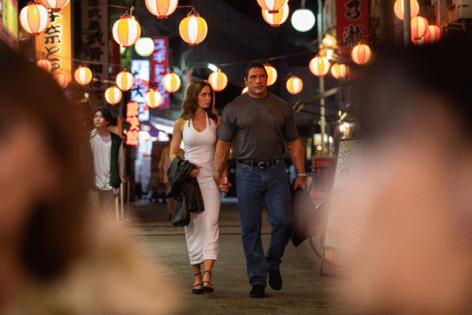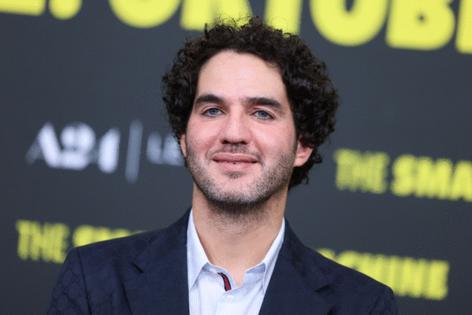He made his name as part of a sibling tag team. Now Benny Safdie enters the ring alone
Published in Entertainment News
LOS ANGELES — Benny Safdie's eyes begin to well up at the memory of it. At September's world premiere of his new film "The Smashing Machine" at the Venice Film Festival, during an intense, emotional scene near the end of the movie, the filmmaker noticed that Mark Kerr, sitting next to him and on whose life the story is based, had begun to sob. Safdie, who had also started to cry, took Kerr's hand.
"So literally, for the rest of the movie, we just held on tight," Safdie says as he presses two fingers to his eye to hold back a tear while sitting in a tucked-away corner meeting room at the West Hollywood offices of the film's distributor, A24, earlier this week.
These may seem unexpected responses to a film that, right off the bat, showcases brutal, bloody mixed martial arts fighting. Kerr was one of the sport's earliest champions, before it became a multibillion-dollar enterprise and his career was derailed by an addiction to painkillers.
Set mostly during the years 1997 to 2000, "The Smashing Machine" stars Dwayne Johnson in a performance of dramatic depth that pulls from his own experience as a professional wrestler before launching a career as a Hollywood superstar. Johnson's Kerr becomes an extremely sympathetic figure even as his own questionable decisions lay the groundwork for his downfall, while much of the story focuses on his volatile relationship with girlfriend Dawn Staples, played by Johnson's "Jungle Cruise" co-star Emily Blunt.
That the real-life Kerr would have such an visceral response to watching it was validating for the 39-year-old Safdie, who wrote, directed and edited the movie and is also a producer on the project, as is Johnson.
"I wanted him to feel some kind of ownership of the movie and his life," says Safdie of Kerr. "And it was very meaningful to me. Now I hear him talk about it and it's very interesting because he can say, 'Oh, I see where I made mistakes in that relationship.' And he can take ownership of them. And part of it is I wanted to make a movie about somebody's perspective on life changing."
Safdie picked up the directing prize in Venice, a remarkable accomplishment for his first solo-directed feature. With his older brother, Josh, Safdie has made a string of critically acclaimed and increasingly commercial films including "Daddy Longlegs," based on their childhood; the documentary "Lenny Cooke," about a high school basketball star who failed to make it as a pro; the anxiety-inducing street-level stories of "Heaven Knows What," based on the memoir of a teenage heroin addict; "Good Time," starring Robert Pattinson as a half-smart criminal; and "Uncut Gems," starring Adam Sandler as an unrepentant gambler.
Benny Safdie has become startlingly busy in the last few years. He has appeared as an actor in significant supporting roles for the likes of Christopher Nolan's "Oppenheimer," Paul Thomas Anderson's "Licorice Pizza," Claire Denis' "Stars at Noon," Kelly Fremon Craig's "Are You There God? It's Me Margaret" and Kyle Newacheck's "Happy Gilmore 2."
He has credits as a producer on the television documentaries "Telemarketers" and "Pee-wee as Himself." And he was a creator and writer on the Showtime series "The Curse," in which he co-starred as a manipulative television producer with Nathan Fielder and Emma Stone. He will also be seen in Nolan's upcoming Homer adaptation "The Odyssey."
Safdie lives in New York City with his wife and two young children. On a recent Sunday night in Los Angeles, he raced from a post-screening Q&A to the Vista Theater to see Anderson's new "One Battle After Another."
He had reached out to the "Boogie Nights" director for some advice while writing the "Smashing Machine" script. He then showed Nolan a bit of the movie while working on the edit.
"I feel like, 'Wow, I can't believe I can talk to these guys about this.'" says Safdie. " But it's also like, you have to be willing to listen. Because they're not going to just tell you stuff you want to hear. So it's a matter of, 'OK, well, why are you doing this?' What's this for?' And then you're just like, 'Well, I don't know. I've got to figure that out now.'"
Anderson was in the audience at the recent Los Angeles premiere of "The Smashing Machine," along with an eclectic crowd that included Fielder and basketball legend Kareem Abdul-Jabbar. Before the screening, Safdie, Johnson and Blunt, along with the real-life Kerr and other members of the cast, took to the stage to introduce the film at the Samuel Goldwyn Theater.
"He was this walking contradiction," Johnson said of Kerr at the film's North American premiere last month at the Toronto International Film Festival, "between being this incredible fighter, but also just a really beautiful human being who was loving and kind and sweet too — and also in ways broken and just trying."
Safdie has helped actors reinvent themselves by placing them into vulnerable situations. Both "Good Time" and "Uncut Gems" were pivotal roles for Pattinson and Sandler, opening them up to a vivid sense of danger, an unpredictably alive quality that was the hallmark of the Safdie brothers' work together.
Audiences have never seen Johnson as he is as Kerr, with his bulked-up physique in counterpoint to his soft-spoken demeanor and gentle voice, except in flashes of anger, such as when he rips a door in half. Safdie has again created a surprising opportunity for his star to charge through.
"With Dwayne, it was the same thing where I saw something where I'm like, 'Wow, nobody knows this side of this guy,'" Safdie says. "He's a really deep, complicated person. When you watch him in 'Fast Five' or 'San Andreas,' it's a great feeling because you know he's going to take care of you. And I think that's really special. But what I really saw was: What if people really know who he is?'"
Though he did his own research and interviews while working on the screenplay, Safdie also had John Hyams' 2002 documentary, "The Smashing Machine: The Life and Times of Extreme Fighter Mark Kerr," to provide a template, with some scenes faithfully reenacted.
"The documentary is real life — this is what actually happened — so that's my starting point," says Safdie. "I wanted this to feel as real as possible in every way, from the cinematography to the production design to the clothing to the performances."
Collaborating with cinematographer Maceo Bishop, Safdie developed an unusual look for the film, meant to evoke the smeared visual style of the era of early digital video covered by the film. Vintage equipment was used for a few scenes, but the majority of the movie was shot on 16mm film, which was then scanned to 4K in postproduction to remove some grain.
"That gives it this otherworldly quality," explains Safdie. "It's like a film stock that doesn't actually exist in reality. It's not 35 and it's not 16, it's something else that we created in this Frankenstein process. But it evokes a feeling and that's the thing that I was after."
Benny's brother Josh has his own movie opening in December, "Marty Supreme," starring Timothée Chalamet in the role of a champion table tennis player. (It's also being released by A24.) Benny says he has not yet seen his brother's movie, though Josh has seen "The Smashing Machine."
There has been a lot of curiosity and speculation around the brothers taking a pause from working together. Does it feel to him like they broke up?
"It just feels like we finished," says Benny Safdie. "It feels like we did what we wanted to do and now I want to do this. And it started with 'The Curse,' where it was like: This is what I want to do and it was my thing. And so that was kind of the first part of it.
"And then when I did that, I got a whole different kind of new collaboration with Nathan and seeing how that works and being like, OK, this is different, I'm learning new things. I've been doing all this stuff with my brother — I love those movies. We did great things together. But now, this is a different feeling."
Safdie adds firmly, "We did what we did and we learned the things that we learned, and now I'm going to try some things on my own."
With an affable exuberance, Safdie has something of the gregarious showman about him. He recently handed out a thousand fliers for "The Smashing Machine" while wearing a sandwich board and walking through Manhattan, a reprise of a similar stunt he had done years before.
"It puts me in my place in a way that I find helpful," he says. "It's amazing that anybody wants to see anything that I'm doing. And I don't take that for granted."
For now Safdie is planning to collaborate with Johnson again, on an adaptation of Daniel Pinkwater's whimsical 1976 children's novel "Lizard Music."
A coda at the end of "The Smashing Machine" shows the real Mark Kerr grocery shopping in Scottsdale, Ariz., in 2025. It may take viewers a moment to realize that it isn't Johnson onscreen — and that was the idea.
"I said to Dwayne, we're going to cut to [Mark] and I guarantee you for five, 10 seconds, people are going to have no idea that it's not you," Safdie says. "You're going to have become the same person. That's my goal. I want that to happen. And it takes you a second to realize: Oh, wait a second. That's the real guy. I was just in his head."
While "The Smashing Machine" represents a step in a new direction for Johnson, it also finds Safdie setting off on a new path as a writer and director on his own after years of collaborations with his brother. Sifting through the emotional and physical struggles of Kerr's life, Safdie found something at its core that aligns with his own ongoing interest in what it takes to move forward despite life's difficulties. It's not about being a loser, he thinks, but it is about not winning.
"I don't know if I hit the beats of what a biopic is," Safdie says. "But I wanted to make a movie about a real person. I want you to be that person. I want you to feel their emotions. And so I always wanted to see Mark at the end."
Though the film opens with the violence of an MMA match, it ends on a much gentler note.
"He's OK," Safdie says. "And he made it through. And isn't that one of the greatest things in the world? How great is life that you can go out there and be OK after all that?"
©2025 Los Angeles Times. Visit latimes.com. Distributed by Tribune Content Agency, LLC.
















Comments